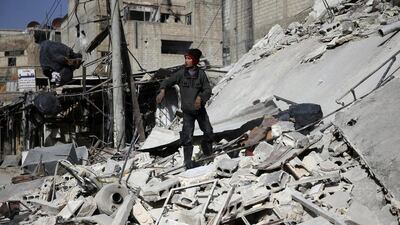When the Syrian regime besieged Aleppo in 2016, the then US ambassador to the UN, Samantha Power, likened it to "those events in world history that define modern evil". Her French counterpart called it the "worst humanitarian tragedy of the 21st century". These powerful statements of censure were never backed up with punitive action. And those who saw Aleppo as the summit of the Syrian regime's capacity for savagery must now contend with the unfolding tragedy in Eastern Ghouta. As Raed Saleh, chief of the volunteer search-and-rescue organisation White Helmets, told The National, what is happening in the rebel-held enclave outside the Syrian capital of Damascus is much worse than what the world witnessed in Aleppo. Some 390,000 people, packed into roughly 10 square kilometres, are "being bombarded by all kinds of weapons, including chlorine gas at times", Mr Saleh explained. White Helmets has deployed 400 volunteers in Eastern Ghouta to help civilians. But how does anyone function in a place where mortar shells fly and bombs rain without a pause?
More than 700 civilians have been killed there in the past three weeks. Today, experts compare Eastern Ghouta to Srebrenica; but the truth is historical precedents can no longer clarify what is happening in Syria. Bashar Al Assad, the Syrian president, is plumbing new depths of brutality. If he is not stopped, Eastern Ghouta itself may be overshadowed by another siege in the future. The tragedy is that the surfeit of condemnatory words echoing in the capitals of the world is accompanied by a shameful deficit of meaningful action. The 30-day ceasefire voted for by the UN Security Council has not materialised. The brief pause in bombing that enabled the delivery of emergency humanitarian aid to Eastern Ghouta on Monday can scarcely be called a ceasefire; it was, more accurately, a recess in which Syrians and Russians rested and reloaded their weapons. Hours after the UN trucks left, 89 people were slaughtered in a reported chemical attack – the fourth in Eastern Ghouta and the eighth in the Syrian civil war.
____________
Read more:
Ghouta death toll hits 800 as Syrian regime pounds suburbs
____________
No amount of bloodshed is too much for Mr Al Assad and his sponsors. But even if he prevails – and, barring international action, such as a new military campaign said to be under consideration by US president Donald Trump, it is hard to see how he won't – what is happening in Syria will continue to haunt its people, especially the young. There are sparks of hope, such as the Oscar nomination for Syrian documentary Last Men In Aleppo this week. Moreover the exiled 8-year-old Syrian activist Bana Al Abed has used her experience of living with war to power a profoundly moving international campaign to draw attention to the plight of her people. The Syrian regime is creating a fresh layer of trauma for its children with every passing hour. How many of them will recover?

